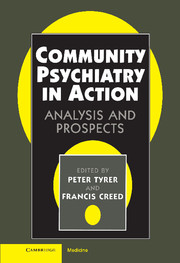Book contents
- Frontmatter
- Contents
- List of contributors
- 1 Essential issues in community psychiatry
- 2 Evaluation of community treatments for acute psychiatric illness
- 3 Synopsis of the Daily Living Programme for the seriously mentally ill: a controlled comparison of home and hospital based care
- 4 Evaluation of a complete community service
- 5 Early intervention study of psychiatric emergencies
- 6 Evaluation of psychiatric services: the merits of regular review
- 7 A home based assessment study
- 8 Home treatment as an alternative to acute psychiatric inpatient admission: a discussion
- 9 The toxicity of community care
- 10 Community mental health services: towards an understanding of cost-effectiveness
- 11 Future research strategies
- Index
11 - Future research strategies
Published online by Cambridge University Press: 06 July 2010
- Frontmatter
- Contents
- List of contributors
- 1 Essential issues in community psychiatry
- 2 Evaluation of community treatments for acute psychiatric illness
- 3 Synopsis of the Daily Living Programme for the seriously mentally ill: a controlled comparison of home and hospital based care
- 4 Evaluation of a complete community service
- 5 Early intervention study of psychiatric emergencies
- 6 Evaluation of psychiatric services: the merits of regular review
- 7 A home based assessment study
- 8 Home treatment as an alternative to acute psychiatric inpatient admission: a discussion
- 9 The toxicity of community care
- 10 Community mental health services: towards an understanding of cost-effectiveness
- 11 Future research strategies
- Index
Summary
Introduction
The last part of the meeting was devoted to a discussion about ideas for new research. The following chapter is an edited version of these contributions. The session was introduced by Professor Tom Craig who sought answers to two important questions that recurred frequently throughout the meeting; the choice of research design and the identification of the special ingredients that made for successful community care. The third issue that received considerable attention was that of training of staff in community psychiatry and the importance of research in evaluating this.
The randomised controlled trial
Many of the limitations of the randomised controlled trial were pointed out by the delegates. Such trials are ideal for comparing specific treatments, such as drugs, where a patient clearly receives one drug or the other. Service utilisation cannot be separated in the same way, although the methodology of the randomised controlled trial tends to force a Procrustean separation. Dr Burns felt that we were too preoccupied in separating hospital and non-hospital treatment. He argued that we were really comparing different ways of delivering services, both of which involved hospital treatment; in very few cases would no hospital treatment be used. The results of the studies described at the meeting (and abroad) showed that with good community care the degree of hospitalisation was reduced for a substantial number of patients. By reducing the overall need of most patients for hospital care important gains were achieved. This did not however mean that hospital care was inappropriate and it would be wrong to interpret the results in this way.
- Type
- Chapter
- Information
- Community Psychiatry in ActionAnalysis and Prospects, pp. 147 - 160Publisher: Cambridge University PressPrint publication year: 1995
- 1
- Cited by



